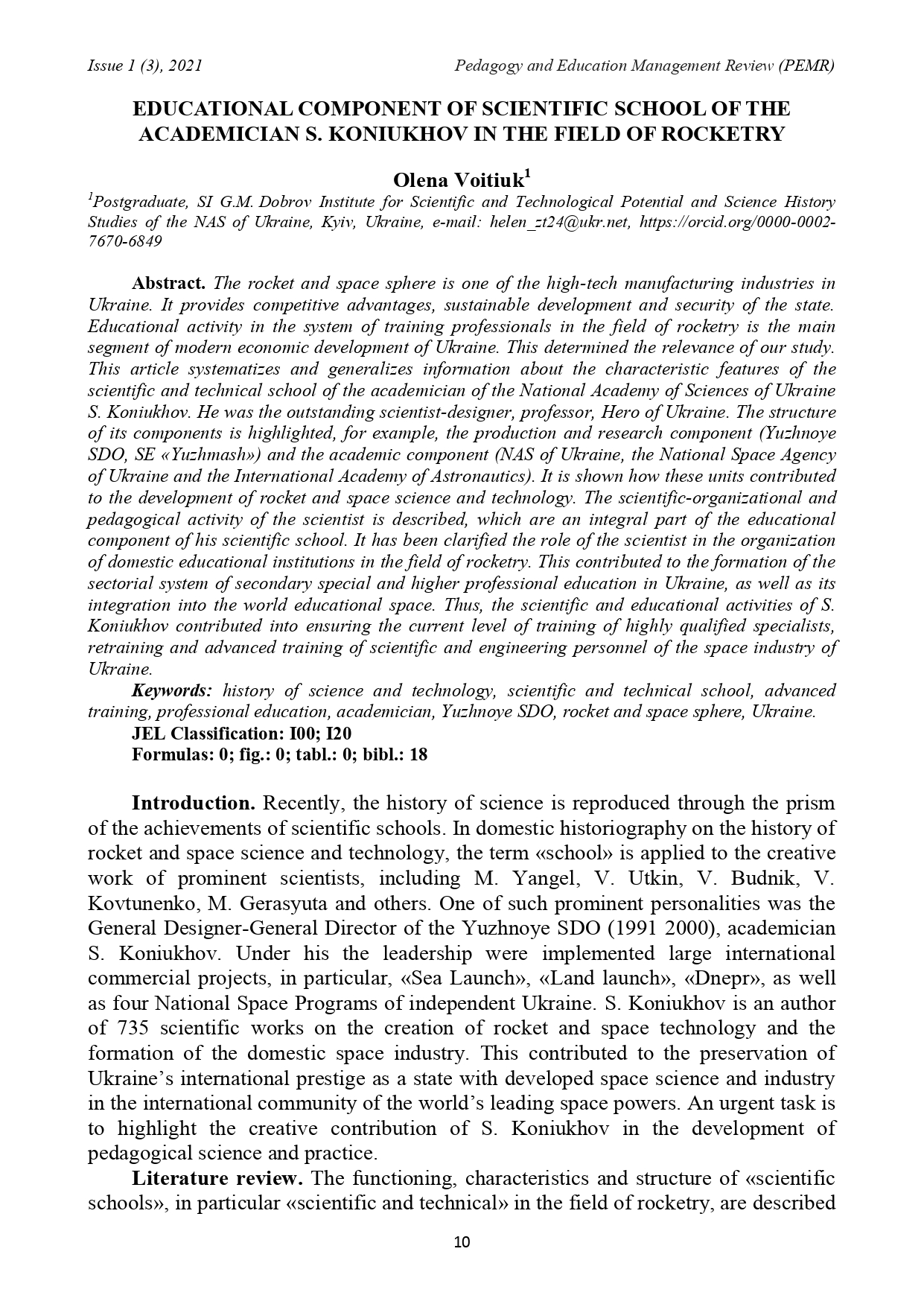EDUCATIONAL COMPONENT OF SCIENTIFIC SCHOOL OF THE ACADEMICIAN S. KONIUKHOV IN THE FIELD OF ROCKETRY
DOI:
https://doi.org/10.36690/2733-2039-2021-1-10Keywords:
history of science and technology, scientific and technical school, advanced training, professional education, academician, Yuzhnoye SDO, rocket and space sphere, UkraineAbstract
The rocket and space sphere is one of the high-tech manufacturing industries in Ukraine. It provides competitive advantages, sustainable development and security of the state. Educational activity in the system of training professionals in the field of rocketry is the main segment of modern economic development of Ukraine. This determined the relevance of our study. This article systematizes and generalizes information about the characteristic features of the scientific and technical school of the academician of the National Academy of Sciences of Ukraine S. Koniukhov. He was the outstanding scientist-designer, professor, Hero of Ukraine. The structure of its components is highlighted, for example, the production and research component (Yuzhnoye SDO, SE «Yuzhmash») and the academic component (NAS of Ukraine, the National Space Agency of Ukraine and the International Academy of Astronautics). It is shown how these units contributed to the development of rocket and space science and technology. The scientific-organizational and pedagogical activity of the scientist is described, which are an integral part of the educational component of his scientific school. It has been clarified the role of the scientist in the organization of domestic educational institutions in the field of rocketry. This contributed to the formation of the sectorial system of secondary special and higher professional education in Ukraine, as well as its integration into the world educational space. Thus, the scientific and educational activities of S. Koniukhov contributed into ensuring the current level of training of highly qualified specialists, retraining and advanced training of scientific and engineering personnel of the space industry of Ukraine.
Downloads
References
Baker, R. S. J. D., Mitrović, A., & Mathews, M. (2010, June). Detecting gaming the system in constraintbased tutors: User modeling, adaptation and personalization. In Lecture Notes in Computer Science, 267–278. Hawaii: HI.
Bosch, A. (1997). Interactive radio instruction: Twenty-three years of improving education quality. Washington, DC: World Bank Group.
Clark, R. A., & Jones, D. (2001). A comparison of traditional and online formats in a public speaking course. Communication Education 50(2), 109–124.
Commonwealth of Learning & Asian Development Bank (Eds.). (2008). Quality assurance in open and distance learning: A toolkit. Vancouver, BC: Commonwealth of Learning and Manila, Philippines: Asian Development Bank.
Dede, C., Clarke, J., Ketelhut, D., Nelson, B., & Bowman, C. (2005). Fostering motivation, learning, and transfer in Multi-User Virtual Environments. Paper presented at the American Educational Research Association Conference, Montréal, Canada.
Deslauriers, L., Schelew, E., & Wieman, C. (2011). Improved learning in a large-enrollment physics class. Science 332(6031), 862–864.
Gee, J. P. (2003). What video games have to teach us about learning and literacy. New York, NY: Palgrave.
Gee, J. P., & Shaffer, D. W. (2010). Looking where the light is bad: Video games and the future of assessment. (Epistemic Games Group Working Paper No. 2010-02) [PDF document]. Madison, WI: University of Wisconsin-Madison. Retrieved from http://epistemicgames.org/eg/wp-content/uploads/Looking-wherethe-light-is-bad-tr1.pdf
Haney, W., & Clarke, M. (2007). Cheating on tests: Prevalence, detection and implications for online testing. In E. Anderson and T. Murdock (Eds.), Psychology of academic cheating (pp. 255–288). Burlington, MA: Elsevier Academic Press.
Moon, B., Leach, J., & Stevens, M. P. (2005). Designing open and distance learning for teacher education in subSaharan Africa: A toolkit for educators and planners [PDF document]. Washington, DC: World Bank.
O’Dwyer, L. M., Masters, J., Dash, S., DeKramer, R. M., Humez, A., & Russell, M. (2010, June). E-learning for educators: Effects of online professional development on teachers and their students. Retrieved from http://www.bc.edu/research/intasc/PDF/EFE_Findings2010_Report.pdf
Shaffer, D. W. (2005). Epistemic games. Innovate: Journal of Online Education 1(6). Retrieved from http://www.nsuworks.nova.edu/cgi/viewcontent.cgi?article=1165&context=innovate
Shaffer, D. W., Squire, K. R., Halverson, R., & Gee, J. P. (2005). Video games and the future of learning. Phi Delta Kappan 87(2), 104–111.
Shaffer, D. W., & Resnick, M. (1999). “Thick” authenticity: New media and authentic learning. Journal of Interactive Learning Research 10(2), 195–215.
Squire, K. (2006). From content to context: Video games as designed experience. Educational Researcher 35(8), 19–29.
Squire, K., & Barab, S. (2004). Replaying history: Engaging urban underserved students in learning world history through computer simulation games. In Proceedings of the 6th International Conference on Learning Sciences ICLS ‘04. Los Angeles, CA: UCLA.
Teng, Y., & Allen, J. (2005). Using Blackboard in an educational psychology course to increase pre-service teachers’ skills and confidence in technology integration. Journal of Interactive Online Learning 3(4), 1–12.
Taylor, J. C. (1995). Distance education technologies: The fourth generation. Australian Journal of Educational Technology 11(2), 1–7. Retrieved from http://www.ascilite.org.au/ajet/ajet11/taylor.html






